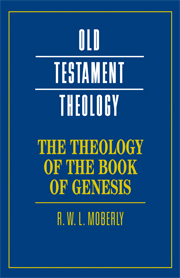Book contents
- Frontmatter
- Contents
- General Editors' Preface
- Preface
- List of Abbreviations
- 1 WHAT IS A “THEOLOGY OF GENESIS”?
- 2 ON READING GENESIS 1–11
- 3 GENESIS 1: PICTURING THE WORLD
- 4 GENESIS 2–3: ADAM AND EVE AND “THE FALL”
- 5 GENESIS 4: CAIN AND ABEL
- 6 GENESIS 6–9: CATACLYSM AND GRACE
- 7 ON READING GENESIS 12–50
- 8 GENESIS 12:1–3: A KEY TO INTERPRETING THE OLD TESTAMENT?
- 9 GENESIS 12:3A: A BIBLICAL BASIS FOR CHRISTIAN ZIONISM?
- 10 GENESIS 22: ABRAHAM – MODEL OR MONSTER?
- 11 ABRAHAM AND THE “ABRAHAMIC FAITHS”
- 12 GENESIS 37–50: IS JOSEPH WISE?
- Further Reading
- Author Index
- Scripture Index
- Subject Index
9 - GENESIS 12:3A: A BIBLICAL BASIS FOR CHRISTIAN ZIONISM?
Published online by Cambridge University Press: 05 June 2012
- Frontmatter
- Contents
- General Editors' Preface
- Preface
- List of Abbreviations
- 1 WHAT IS A “THEOLOGY OF GENESIS”?
- 2 ON READING GENESIS 1–11
- 3 GENESIS 1: PICTURING THE WORLD
- 4 GENESIS 2–3: ADAM AND EVE AND “THE FALL”
- 5 GENESIS 4: CAIN AND ABEL
- 6 GENESIS 6–9: CATACLYSM AND GRACE
- 7 ON READING GENESIS 12–50
- 8 GENESIS 12:1–3: A KEY TO INTERPRETING THE OLD TESTAMENT?
- 9 GENESIS 12:3A: A BIBLICAL BASIS FOR CHRISTIAN ZIONISM?
- 10 GENESIS 22: ABRAHAM – MODEL OR MONSTER?
- 11 ABRAHAM AND THE “ABRAHAMIC FAITHS”
- 12 GENESIS 37–50: IS JOSEPH WISE?
- Further Reading
- Author Index
- Scripture Index
- Subject Index
Summary
In the previous chapter, we saw that the extensive scholarly interest that has been directed to Genesis 12:1–3 has tended to focus on v. 3b. By contrast, little scholarly attention has been given to v. 3a, where Yhwh says to Abram, “I will bless those who blessyou, and the one who curses you I will curse.” To be sure, there is some passing comment, but it tends to be little more than routine.1 Beyond scholarly circles, however, things look different, and at the present time, at least within some Christian groupings within the United States of America, there is great interest in 12:3a, which is taken to mandate U.S. support for the state of Israel, support that is practical, both financial and military, and not solely idealistic. Since I do not think it wise for biblical scholars to ignore the actual use that the Bible receives beyond the academy, and since the appeal to Genesis 12:3a raises interesting issues about what constitutes good interpretation and use of Genesis, it will be appropriate here to consider briefly this particular appeal to this text.
WHY CHRISTIANS SHOULD SUPPORT ISRAEL
The phenomenon of Christian Zionism is complex and takes many forms, both distinct from and overlapping with the numerous Jewish forms. My impression, however, is that appeal to Genesis 12:3a has been promoted especially by Christians operating within a premillennial dispensationalist frame of reference and that this particular form of Zionism has had significant public impact and influence. So this will be my focus here.
- Type
- Chapter
- Information
- The Theology of the Book of Genesis , pp. 162 - 178Publisher: Cambridge University PressPrint publication year: 2009



